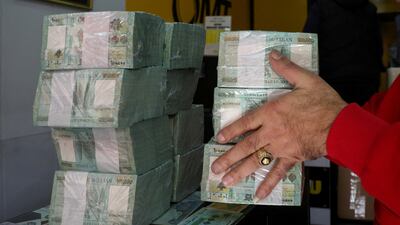After a difficult 2022 for many in the Middle East, there have naturally been hopes that the start of 2023 might bring reprieve. One of the biggest issues facing a number of countries in the region is plummeting national currencies. With the new year barely under way, there is already evidence to suggest that the situation on that front is going to get worse in 2023, not better.
An indicator of how bad things are in a number of countries is the rising cost of prices. In Lebanon, inflation surged by 171.2 per cent in 2022. It is little surprise that the World Bank calls the country's economic crisis one of the worst in history. There are ways for the situation to improve. Inflation in Sudan reached about 380 per cent in 2021. That started to decline last year after economic reforms.
Lebanon will need more than new policies, but political will, too. Time is not on its side. Last week, for example, the International Monetary Fund (IMF) said that the country's tax revenue more than halved between 2019 and 2021.
The political class that should be carrying out this crucial work is inept at best. They have yet to implement reforms required to unlock $3 billion of assistance from the IMF. At worst, those responsible for the country’s economic welfare are suspected of being corrupt. Last week, The National reported that at least six European countries have opened an investigation into the governor of Lebanon's central bank, Riad Salameh. Prosecutors are investigating transfers of more than $330 million allegedly embezzled from the Banque du Liban through a company owned by the governor’s brother, Raja Salameh.
The result of all this instability is an out-of-control currency. It is hard to quantify the scale of the depreciation, but there have been some novel examples. On Tuesday, Beirut resident Christian Mischler tweeted a cafe bill that shows the price of the same coffee increasing after just three hours.
Iraqis are also familiar with a spiralling currency, which has been fluctuating wildly for months as prices continue to rise. More disruption arrived on Tuesday, when Iraqi Prime Minister Mohammed Shia Al Sudani dismissed the country's central bank governor and assigned its former chief, Ali Mohsen Al Alaq.
With a spiralling currency, change is needed. But some Iraqis will not be convinced by Mr Alaq's re-appointment. His last time in the position, between September 2014 to September 2020, was stained not just by inflation, but by an almost unbelievable incident in which 7 billion Iraqi dinars were destroyed after rainwater entered the vault of the state-run Al Rafidain Bank.
In neighbouring Iran, the national currency fell to record lows against the US dollar this weekend. It has been a victim of Iran's decades-long economic and political isolation, but fears of a new round of western sanctions are putting a particular strain on the economy. Relations with the US, the UK and the EU have deteriorated in recent months due to Tehran's intransigence over its nuclear file and repression of ongoing protests, and more sanctions are on the cards.
It has taken less than a month for the Middle East's most challenged economies to show the world that 2023 is going to be a tough year, if not tougher than previous ones. It is not the start that had been hoped for. In all three countries, avenues for improvement exist. But last year, and the years before, demonstrate that solutions might once again be ignored and more opportunities missed.













